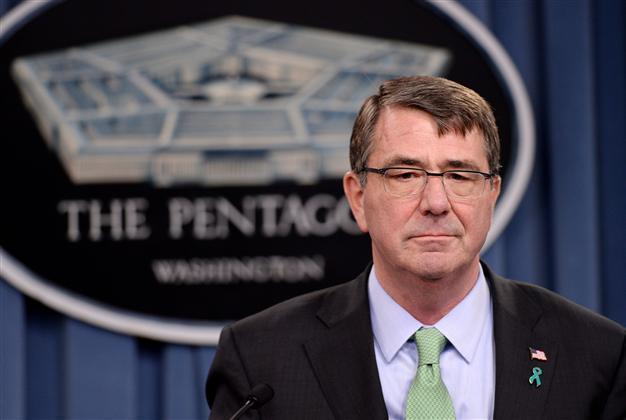US plans to store heavy arms in Baltic, E.Europe: Source
WASHINGTON - Reuters

Secretary of Defense Ashton Carter. AFP Photo
The United States plans to store heavy military equipment in the Baltics and Eastern European nations to reassure allies made uneasy by Russian intervention in Ukraine, and to deter further aggression, a senior U.S. official said on June 13."We will pre-position significant equipment," the official said, commenting on a New York Times report that the Pentagon was poised to store battle tanks, infantry fighting vehicles and other heavy weapons for as many as 5,000 troops.
The Polish defence ministry confirmed Warsaw was in talks with the United States about stationing US army equipment warehouses in Poland.
"During talks in Washington in May I have been assured that the decision will be taken soon," the Polish defence ministry tweeted, quoting Defence Minister Tomasz Siemoniak. "This is another step to increase US presence in Poland and the region."
The US official, who spoke on condition of anonymity, declined to comment on the details of the report, which cited US and allied officials.
The report said the move, if approved, would mark the first time since the Cold War that Washington has stationed heavy military equipment in the newer NATO member states in Eastern Europe that once formed part of the Soviet sphere of influence.
The proposal, which seeks to reassure European allies in the wake of Russia's annexation of Ukraine's Crimea in March 2014, is expected to be approved by US Defense Secretary Ash Carter and the White House before a NATO defense ministers' meeting in Brussels this month, the paper said, quoting senior officials.
Asked about the article, a Pentagon spokesman said no decision had been made about the equipment.
"Over the last few years, the United States military has increased the prepositioning of equipment for training and exercises with our NATO allies and partners," Colonel Steve Warren said.
"The US military continues to review the best location to store these materials in consultation with our allies," he said in a statement.
"At this time, we have made no decision about if or when to move to this equipment."
As it now stood, the Times said, the proposal envisaged that "a company's worth of equipment, enough for about 150 soldiers, would be stored in each of the three Baltic nations: Lithuania, Latvia and Estonia.
Enough for a company or possibly a battalion, or about 750 soldiers, would be located in Poland, Romania, Bulgaria and possibly Hungary."
















